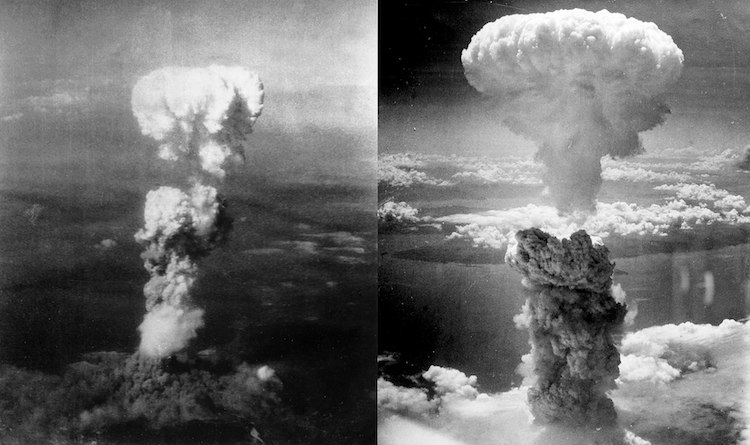By LEILA LEMGHALEF
UNITED NATIONS (IPS) – Unchecked climate change and the nuclear arms race have propelled the minute hand of the Doomsday Clock forward two minutes closer to midnight, from its 2012 placement of five minutes to midnight. JAPANESE | SWEDISH
The decision was announced in Washington DC by members of the Bulletin of the Atomic Scientists (BAS), the body behind the calculations and creation of the 1947 Clock of Doom.
The last time the clock was at three minutes to midnight was in 1984, when U.S.-Soviet relations were described by BAS as having “reached their iciest point in decades”.
Today’s polemic takes into account the immutable laws of science in relation to the “climate catastrophe” as well as the activities of modernisation of massive nuclear arsenals, which come with inadvertent risks.
“The question gets much more complicated than someone with their finger on the button,” said Kennette Benedict, executive director of BAS.
Another major problem is the world’s addiction to fossil fuels, said BAS.
Climate change and nuclear tensions were placed on equal footing in this year’s warning.
“And while fossil-fuel burning technologies may seem like a less kind of abrupt way to ruin the world, they’re doing it in slow motion,” said Benedict.
Citizen’s potential
“Negotiators on the international treaty of climate change or any international treaty are working within the fairly narrow latitude afforded them by their governments. And the governments themselves are working within the latitudes afforded them by their constituencies,” said BAS member of the Science and Security Board Sivan Kartha, senior scientist with the Stockholm Environment Institute.
Real cooperation on the international front, he said, “will rely on there being a demand for that, a mandate for that, from constituencies within countries,” also noting “today’s extremely daunting political opposition to climate action”.
President of the Global Security Institute Jonathan Granoff described a series of global existential challenges that could accelerate the arrival of doomsday, including the stability of the climate, the acidity of the oceans, and biodiversity, as well as widespread goals of strategic stability and the pursuit of dominance.
“Remember we are extinguishing species at up to one thousand times faster than what would be the normal evolutionary base rate,” he told IPS. “The backdrop of these challenges arising from science, technology, and social organisation is the immature relationship between states in their pursuit of security through the application of the threat or use of force. The most dangerous tool of the pursuit of security through force are the world’s nuclear arsenals.
“…On the other hand, a growing consensus within informed members of global governance and civil society is rapidly coming to understand that no nation can be secure in an insecure world. And the business community has rapidly integrated in such a fashion that they have demonstrated the capacity of cooperation, if driven by recognised self-interests,” he said.
“I am reminded that in the 17th Century, the world moved from the predominance of the city-state into the modern world of the nation state. Such a phenomena required national identity. National identity occurred largely because of national grammar and language, which rested on the technological innovations of the printing press.
“Today, the technology that will allow us to have global cultural grammar and identity is being provided by the Internet. And thus, the tools, to move from the dis-functionality of posing national interest against the global common good has the potential to be overcome.”
In light of his analysis, the clock’s minute hand can be influenced for the better or for the worse, and 2015 will present opportunities for progress to be made.
The simple truth
Alyn Ware is a member of the World Future Council and the coordinator of Global Wave 2015, an initiative on “Global Action to Wave Goodbye to Nukes”.
Ware spoke to IPS ahead of the 2015 Review Conference of the Parties to the Treaty on the Non-Proliferation of Nuclear Weapons.
“The hundreds of billions of dollars that’s wasted on nuclear weapons is needed in order to shift our economy from a carbon-based economy to an economy based on renewable energy,” he told IPS, also explaining that “the competition and the confrontation and conflicts that are perpetuated by nuclear weapons prevent the type of cooperation that’s required for addressing climate change.
“The simple truth on nuclear weapons is that they are inconsistent with civilisation. Threatening to annihilate cities, innocent people, future generations, is not consistent with humanity,” Ware told IPS.
“And then there’s also a simple truth with climate change,” he added. “The simple truth is we have to move from a carbon-based economy to one that’s focused more on renewable energies.”
He also acknowledged the nuances surrounding the implementation of these simple truths.
“At the moment, we don’t have sufficient political commitment to either of them,” he said, addressing vested interests preventing that kind of action, including corporations making nuclear weapons or selling oil, coal or gas.
“What we’re looking at is empowering people,” he said.
For that reason, he thinks the Doomsday Clock is very good. “Because it’s simple, it’s really understandable, and it gives the idea that, hey, we can all be involved in this.” (IPS | 23 January 2015)
Images from the atomic bombing of Japan in 1945. Credit: public domain
Original <> http://www.ipsnews.net/2015/01/three-minutes-away-from-doomsday/




